Cross-border flow of young knowledge
Under the leadership of Dr. Le Viet Quoc (Google Brain), Dr. Tran Viet Hung (Got It), Dr. Vu Xuan Son and MSc. To Dieu Lien, a group of Vietnamese experts working at leading technology corporations and universities in the world have jointly established the non-profit organization “AI for Vietnam” (AIV) in Silicon Valley (USA). Their goal is to bring artificial intelligence (AI) closer to the Vietnamese people, as a tool to accelerate learning, working, business and innovation. AIV aims to build a comprehensive AI ecosystem for Vietnam, from education, research to practical application. AIV's first project is ViGen, a collaborative initiative with Meta to build the largest open-source Vietnamese dataset ever. AIV believes that data is the “lifeblood” of AI, while Vietnamese is still very limited in machine learning systems. ViGen will help create a foundation for AI models to understand and process Vietnamese more accurately, thereby promoting domestic AI applications in education, healthcare and many other fields. Although only recently established, AIV has been operating at high intensity and has received support from the global technology community. All members work voluntarily, without salary, with the spirit of dedication to the future of Vietnamese technology. They believe that by "standing on the shoulders of giants" - taking advantage of international open source models and combining local data - Vietnam can completely shorten the gap with the world.
Another inspiring story is the story of AlphaGeometry software - an AI tool capable of solving geometry problems at the International Olympiad (IMO) level, achieving an impressive achievement: solving 25/30 test problems, equivalent to a candidate winning an IMO Gold Medal. This is the result of a collaboration between a group of experts at Google DeepMind including Dr. Trinh Hoang Trieu, Dr. Le Viet Quoc, Dr. Yuhuai Wu and Dr. Luong Minh Thang. According to Dr. Luong Minh Thang and his colleagues, AlphaGeometry marks an important step towards "artificial general intelligence" (AGI) - a system capable of thinking and learning like humans. In addition to research, Dr. Luong Minh Thang also co-founded the VietAI organization to train a generation of AI engineers for Vietnam, with more than 4,000 students and many of whom have become experts recognized by Google. Dr. Luong Minh Thang and his colleagues are also implementing initiatives such as the New Turing Institute and organizing AI conferences in Vietnam, hoping to turn AI into a driving force for sustainable development.
A name not too unfamiliar to young Vietnamese people is Huyen Chip (real name is Khanh Huyen), once famous for the book "Pick up your backpack and go". Up to now, she has had an admirable turning point: graduating with a bachelor's and master's degree in artificial intelligence from Stanford University (USA) and becoming the author of two books specializing in AI technology. Those are "Designing Machine Learning Systems" - instructions on how to build safe and effective machine learning systems and "AI Engineering" - focusing on applying generative AI like GPT to business practices. Huyen Chip sees AI as a tool to help remove barriers, especially in education and language. She is working with startups to deploy a personalized learning model, helping children learn to read more effectively thanks to AI designing programs suitable for each individual. At the same time, she also researches the application of techniques from video games to teaching to increase concentration and interest in learning.
 |
Huyen Chip has become the author of two books specializing in AI technology. (Photo: Facebook Huyen Chip) |
Another notable name is Dr. Hoang Anh Duc, 35 years old, who has just been elected by the Global Young Scientists Academy (GYA) for the 2025-2030 term, becoming the 5th Vietnamese to join this network. Dr. Duc is currently a researcher at RMIT University Vietnam and General Director of the Sky-Line education system. He was honored for his outstanding contributions to educational research, digital transformation and promoting open science - sharing data, methods and research results in a transparent manner, helping to increase connectivity and practical impact. Dr. Duc has had many outstanding initiatives in education, especially in the context of the Covid-19 pandemic such as the Mental Health Handbook for Students - spreading to more than 3,500 schools in Vietnam. He is also the author of the book series "Scientific Storytelling" with the goal of inspiring curiosity and love of science in children.
Unleashing the potential of overseas youth resources
In the context that science and technology have become the lifeblood of development, the key to opening the door to a prosperous future for each country; Vietnam, on its journey of integration, always craves high-quality intellectual resources, especially from the community of talented young Vietnamese overseas.
The above examples are just a small part of the larger picture of the contributions of overseas youth to the development of science and technology in Vietnam. Currently, the number of Vietnamese scientists and intellectuals working at many large corporations in the world in the fields of science, technology and innovation is increasingly large and influential. In addition to the international intellectual force of Vietnamese origin, the second and third generations of Vietnamese experts born and raised abroad are also seen as potential resources that are worth paying attention to. Approaching, connecting and creating conditions for them to stay and contribute to the development of the country is becoming an important direction that needs more attention in the coming time.
In fact, the phenomenon of “brain drain” is gradually being replaced by a positive counter-wave: the return of talented young people. These individuals bring with them experience, global thinking and extensive networks, making practical contributions to research projects, innovation and high-tech business development.
However, to make the most of this resource, Vietnam needs to have a clear policy of attraction and treatment. As domestic experts have commented, besides efforts to integrate internationally, there are still barriers such as salaries and working conditions that are not really competitive. Improving the working environment, investing in research infrastructure and simplifying administrative procedures are key factors to retain talent. In addition, Vietnam needs to create a truly solid and inspiring innovation ecosystem. It is a place where young people are trusted, empowered and have space to maximize their abilities. Every idea needs to be listened to seriously, every initiative needs the opportunity to be tested and replicated, instead of being stifled by institutional barriers.
On the other hand, a country that wants to make a breakthrough cannot lack “big problems” - urgent and long-term issues, so that young people, wherever they are, feel they have a role in solving them. In general, policies to attract talent need to go hand in hand with concrete actions, for example, appropriate remuneration, professional development opportunities, modern research infrastructure and especially a transparent, open working environment that encourages creativity...
In this process, education is the key to sustainability, connecting today's generation with the next generation. It is understandable that when science and technology become the pillar of national development, introducing STEM education from primary school is no longer a choice, but an inevitable requirement. Children need to be exposed early to logical thinking, problem-solving ability and especially a passion for discovery. From there, they will grow up with a spirit of innovation and awareness that knowledge is not only for self-accumulation, but also for contributing to the community.
Education is therefore not only a place to sow the seeds of knowledge, but also a bridge connecting Vietnamese people around the world. When the domestic education system is strong enough, pioneering and deeply humane, it will become a solid spiritual support and a great source of motivation for Vietnamese people living far away from home to return and contribute. They are inspired by the long-term vision, the desire to constantly improve and the nation's persistent spirit of learning. That is the positive cycle that education can create for the future of Vietnam.
Source: https://baophapluat.vn/nguoi-tre-hai-ngoai-huong-ve-to-quoc-post545846.html


![[Photo] Prime Minister Pham Minh Chinh meets with US business representatives](https://vphoto.vietnam.vn/thumb/1200x675/vietnam/resource/IMAGE/2025/5/13/5bf2bff8977041adab2baf9944e547b5)
![[Photo] President Luong Cuong attends the inauguration of the international container port in Hai Phong](https://vphoto.vietnam.vn/thumb/1200x675/vietnam/resource/IMAGE/2025/5/13/9544c01a03e241fdadb6f9708e1c0b65)




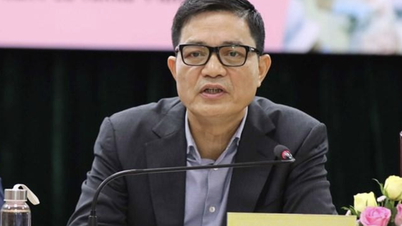

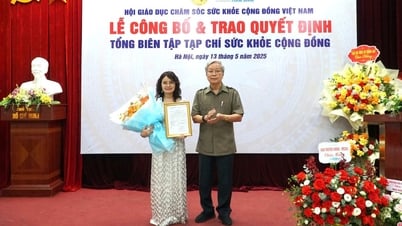







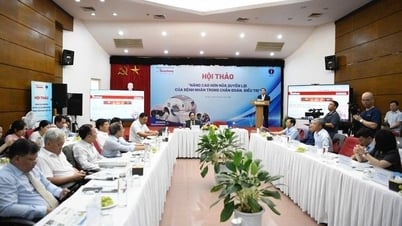



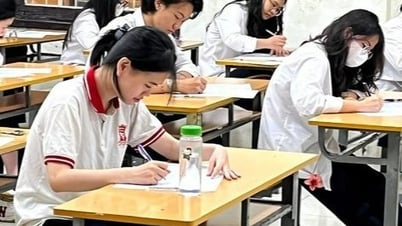
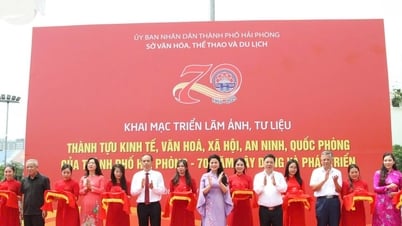






















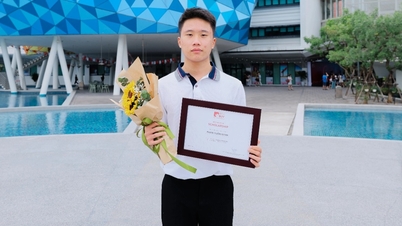

































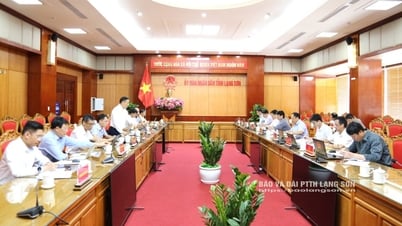














Comment (0)